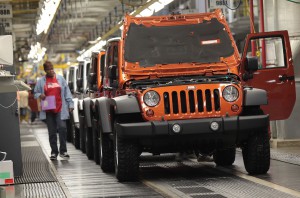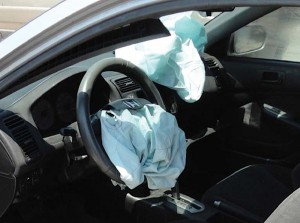
New Jeep Wranglers will now use an updated version of the Takata airbags, at least for North America.
(This story has been updated.)
The last Jeep Wrangler to use potentially defective Takata airbags will roll down the assembly line next week – for the North American market, anyway.
Jeep parent Fiat Chrysler Automobiles was recently identified as one of four manufacturers still using airbags produced by Japanese supplier Takata in new vehicles due to a shortage of safer replacement parts. The other manufacturers identified by the Senate Commerce Committee include Mitsubishi, Toyota and Volkswagen.
FCA said it will switch to a new airbag design, “by next week,” for vehicles sold in the U.S., Canada and Mexico. It will, however, continue to use the older Takata airbags in Jeep Wranglers shipped to other markets.
The suspect airbags currently are not on the list of active recalls ordered by the National Highway Traffic Safety Administration – but they will be over the next several years.
Due to a series of design and manufacturing issues, older Takata airbags have shown a propensity to fail catastrophically when triggered by a crash, spewing plastic and metal shrapnel into the passenger compartment. At least 13 people have been killed worldwide, with over 100 injured.
NHTSA last October ordered the recall of 24 million vehicles equipped with the suspect airbags. But, as evidence has mounted that newer vehicles are also at risk, the agency has said it will eventually add tens of millions more vehicles to the list. It is following a three-phase rollout of the latest recall, initially targeting older vehicles used in high humidity environments. Heat and humidity have been shown to increase the risk of a malfunction with the Takata airbags.

The modified Takata airbags use a chemical desiccant to absorb moisture and reduce the risk of a Takata airbag malfunction in humid climates.
(Eight automakers announce recall of another 12 mil. Takata airbags. Click Here for the latest.)
The size of the original recall was already creating challenges for both Takata and its automaker customers, many owners reporting they were unable to get their airbags replaced because of parts shortages.
Some automakers have been replacing old Takata airbags with newer ones of the same design – research suggesting that it takes at least three years before the chemical used as an explosive propellant may begin to break down.
Meanwhile, a report released earlier this month by Sen. Bill Nelson, the ranking Democrat on the Senate Commerce Committee, also revealed that four makers, Fiat Chrysler, Mitsubishi and Volkswagen, were using the old airbag design in brand new vehicles.
(For more on that report, Click Here.)
All four said they expect to recall those vehicles within the next several years once new airbag designs are available.
Automakers have been pressing Takata to speed up production of those newer airbags which use either a new form of propellant or add a desiccant – a moisture absorbing chemical intended to prevent ammonium nitrate chemical propellants from breaking down.
Fiat Chrysler has been able to secure a supply of the newer bags, at least enough to handle production of the 2016 Jeep Wrangler for the NAFTA region. Vehicles earmarked for other markets will make the switch mid-September.
All vehicles that have or will continue to be equipped with the suspect airbags will eventually need to be recalled, FCA officials confirmed. The target date is no later than 2019, according to NHTSA’s plan.
The goal is to “ensure the inflators will be recalled and replaced before they become dangerous, giving vehicle owners sufficient time to have them replaced before they pose a danger to vehicle occupants,” FCA said in a statement.
The other three makers have expressed plans to switch to newer airbags as soon as possible.
Both FCA and Toyota have said they will advise customers who purchase vehicles with the older airbags that they will eventually face a recall to replace the Takata devices.
(Death of Star Trek actor highlights concerns about new generation of electronic shifters. Click Here for more.)

